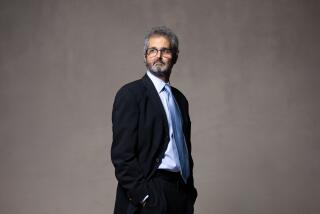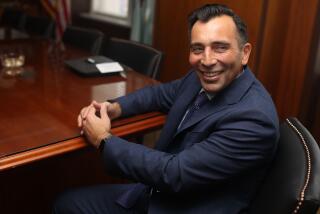Arthur Kinoy, 82; as Lead Attorney, Won Reversal of Guilty Verdicts for Chicago 7
- Share via
Arthur Kinoy, the short, bald lawyer and educator who loomed like Hercules over civil rights causes from the trials of executed spies Julius and Ethel Rosenberg and the anti-Vietnam Chicago Seven to cases involving racial integration and federal wiretapping, has died. He was 82.
Kinoy, a founding co-president of the Manhattan-based Center for Constitutional Rights, died Friday at his home in Montclair, N.J., of unstated causes.
“I will never quit,” the powerful orator said in 1995 in a funeral salute to his longtime ally and former law partner William Kunstler. “I am old and small but I will not stop because I know what I am doing and the others do not. And I believe in what I am doing and the others believe in nothing and fear everything.”
Kinoy and Kunstler worked together in the 1960s in the Deep South, using courts to establish voting and integration rights for blacks. It was Kinoy who convinced a reluctant Virginia judge that post-Civil War reconstruction law enabled blacks to take their complaints into federal courts -- a breakthrough in winning fairer hearings against racist local law enforcement and officials.
With Leonard I. Weinglass, Kinoy and Kunstler also worked together in the trial and appeals of the Chicago Seven, defending prominent activists against the Vietnam War -- including Abbie Hoffman, Jerry Rubin and Tom Hayden, who went on to become a California state senator -- on charges of conspiracy to incite riots at the 1968 Democratic National Convention in Chicago. The seven were found guilty, but with Kinoy as lead attorney on the appeal, the verdicts were reversed, clearing all defendants.
Kinoy, often cited as the “brains” among civil rights lawyers, argued before the U.S. Supreme Court about half a dozen times. In 1969, he won reversal of the 1967 ouster of Rep. Adam Clayton Powell (D-Harlem) from Congress on charges of misuse of public funds. Three years later, Kinoy won approval of his claim that then President Nixon had no “inherent power” to wiretap local political organizations -- a decision that Kinoy personally credited as leading to Watergate and the downfall of Nixon.
As a young lawyer, Kinoy assisted on the Rosenberg trial for atomic espionage. In 1953, he made the final appeal to prevent the couple’s execution. He said he would have won but for what he said was the cowardice of the federal judge in charge.
Kinoy taught at Rutgers University Law School from 1964 until 1991, when he was forced into retirement by a controversial law requiring professors to step down at age 70. For many years, he combined teaching with practicing law, often under the auspices of the Center for Constitutional Rights, which he co-founded in 1966 with Kunstler and others who had worked for black rights in Mississippi.
The diminutive lawyer frequently appeared before the House Un-American Activities Committee, defending clients who had been subpoenaed, during both the anti-Communist McCarthy era and protests of the Vietnam War.
In 1966, in a highly publicized squabble when Kinoy protested the refusal of his right to cross-examine a witness, the committee chairman ousted him from the hearing room and had him charged with disorderly conduct. Kinoy was found guilty and fined $5. But dozens of attorneys rose to his defense, and in 1968 his conviction was overturned.
Kinoy enjoyed pointing out, however, that “the appellate court opinion still stated that I was loud and boisterous.”
“One of the skills you all must learn to be a lawyer for the people,” he would tell his law classes, “is how to be loud and boisterous.”
Kinoy detailed his colorful career in his 1983 autobiography, “Rights on Trial: The Odyssey of a People’s Lawyer.”
Although tinged with Kinoy’s idealistic leftist politics and highly criticized by conservatives, the book earned general praise.
“Kinoy emerges as the thoughtful, self-effacing hero of his own adventure story,” wrote attorney Morton Kamins in a review for The Times, “... using his skills and talents to help in the struggle of workers against employees, poor against rich, blacks against the white power structure.”
Kamins, who like others disagreed with many of Kinoy’s views of the absolute right and wrong of various cases, wrote that Kinoy’s book excelled in relating the work of civil rights lawyers assisting blacks in the South.
“For once,” the reviewer said, “the issue truly was ‘black and white,’ good vs. evil.”
“The need to merge the fight for the individual with the overall fight against the system emerges most clearly,” the reviewer continued. “These painful and triumphant chapters are the living heart of this book.
“Passion and scholarship were the twin foundations on which the civil rights lawyers operated,” Kamins concluded, “and on which Kinoy has built his whole career.”
Born in New York to Jewish immigrant parents who became teachers, Kinoy was brought up in Brooklyn and graduated magna cum laude from Harvard, where he was active in radical student organizations.
He served in the Army in North Africa and Italy during World War II and then earned his law degree at Columbia University, where he was executive editor of the Law Review.
Kinoy began his career as a lawyer for the United Electrical Workers and then formed a small law firm. His partnership with Kunstler in Kunstler, Kunstler & Kinoy began in 1964.
Divorced from his first wife, Susan, who died in 1999, Kinoy is survived by his wife, Barbara Webster; two children from his first marriage, Peter and Joanne; and four grandchildren.
More to Read
Sign up for Essential California
The most important California stories and recommendations in your inbox every morning.
You may occasionally receive promotional content from the Los Angeles Times.










